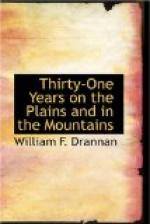After thanking them, I took my little bundle, bade them good-bye, and was on my journey again. I have always regretted that I did not learn this good man’s name, but I was in something of a hurry just then, for I feared that Mr. Drake might get on my trail and follow me and take me back, and I had no pressing inclination to meet old Hulda again.
I plodded along for many days, now and then looking back for Mr. Drake, but not anxious to see him; rather the reverse.
It is not necessary to lumber up this story with my trip to St. Louis. I was about six weeks on the road, the greater part of the time in Kentucky, and I had no use for my money. I could stay at almost any farm-house all night, wherever I stopped, and have a good bed and be well fed, but no one would take pay for these accommodations. When I got to Owensboro, Ky., I became acquainted by accident with the mate of a steamboat that was going to St. Louis and he allowed me to go on the boat and work my way.
The first person that I met in St Louis, that I dared to speak with, was a boy somewhat younger than myself. I asked him his name, and in broken English he replied that his name was Henry Becket.
Seeing that he was French, I began to talk to him in his own language, which was my mother tongue, and so we were quickly friends. I told him that my parents were both dead and that I had no home, and he being of a kind-hearted, sympathetic nature, invited me to go home with him, which invitation I immediately accepted.
Henry Becket’s mother was a widow and they were very poor, but they were lovingly kind to me.
I told Mrs. Becket of my troubles with Mr. Drake’s old negro woman; how much abuse I had suffered at her hands and the widow sympathized with me deeply. She also told me that I was welcome to stay with them until such time as I was able to get employment. So I remained with the Beckets three days, during all of which time I tried hard to get work, but without success.
On the morning of the fourth day she asked me if I had tried any of the hotels for work. I told her that I had not, so she advised me to go to some of them in my rounds.
It had not occurred to me that a boy could find anything to do about a hotel, but I took Mrs. Becket’s advice, and that morning called at the American hotel, which was the first one I came to.
Quite boldly, for a green boy, I approached the person whom I was told was the proprietor and asked him if he had any work for a boy, whereupon he looked at me in what seemed a most scornful way and said very tartly:
“What kind of work do you think you could do?”
I told him I could do most anything in the way of common labor.
He gave me another half-scornful smile and said:
“I think you had better go home to your parents and go to school. That’s the best place for you.”




